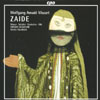Mozart Zaide
An intriguing completion of this early Singspiel, but casting could be stronger
View record and artist detailsRecord and Artist Details
Composer or Director: Wolfgang Amadeus Mozart
Genre:
Opera
Label: CPO
Magazine Review Date: 5/2009
Media Format: CD or Download
Media Runtime: 0
Mastering:
Stereo
DDD
Catalogue Number: CPO777 281-2

Tracks:
| Composition | Artist Credit |
|---|---|
| Zaïde |
Wolfgang Amadeus Mozart, Composer
Isabel Monar, Zaide, Soprano Markus Schäfer, Gomatz, Tenor Martin Haselböck, Conductor Vienna Academy Choir Vienna Academy Orchestra Wolfgang Amadeus Mozart, Composer |
Author: Richard Wigmore
If only the performance were more strongly cast. Martin Haselböck, while not the most poetic of conductors, has a sharp ear for felicitous woodwind detail, and encourages playing of crackling energy in numbers like the Sultan’s melodrama and Zaïde’s magnificently defiant “Tiger” aria. Spanish soprano Isabel Monar sings this with plenty of fire, though pleasure in her lyrical music, including the ravishing lullaby “Ruhe sanft”, is marred by the bright glare on her tone and a lack of grace in the phrasing. Markus Schäfer’s Gomatz, too, is better in vehement than lyrical mode (his soft singing tends to rawness), while Markus Brutscher’s thinvoiced, hammy Sultan sounds like a displaced Monostatos. All the soloists, including the feeble Allazim (who also sings Osmin’s comic drinking song, here relegated to an appendix), are eclipsed by their counterparts on the two rival recordings: the theatrically intense Harnoncourt, which dubiously replaces dialogue with a “topical” narrative, and the warmer-toned Goodwin performance, with Lynne Dawson profoundly touching in the title-role.
Discover the world's largest classical music catalogue with Presto Music.

Gramophone Digital Club
- Digital Edition
- Digital Archive
- Reviews Database
- Full website access
From £8.75 / month
Subscribe
Gramophone Full Club
- Print Edition
- Digital Edition
- Digital Archive
- Reviews Database
- Full website access
From £11.00 / month
Subscribe
If you are a library, university or other organisation that would be interested in an institutional subscription to Gramophone please click here for further information.




